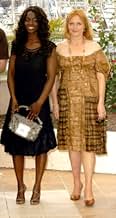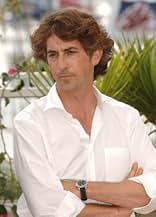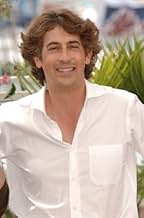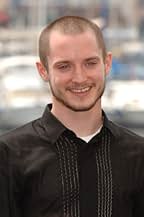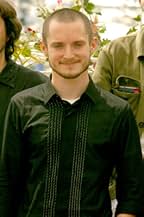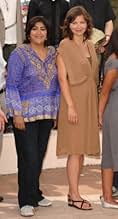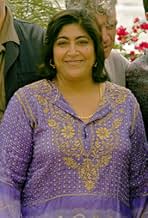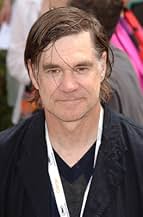Paris, je t'aime
Through the neighborhoods of Paris, love is veiled, revealed, imitated, sucked dry, reinvented, and awakened.Through the neighborhoods of Paris, love is veiled, revealed, imitated, sucked dry, reinvented, and awakened.Through the neighborhoods of Paris, love is veiled, revealed, imitated, sucked dry, reinvented, and awakened.
- Awards
- 3 wins & 2 nominations total
Melchior Derouet
- Thomas (segment "Faubourg Saint-Denis")
- (as Melchior Beslon)
Featured reviews
18 directors had the same task: tell stories of love set in Paris. Naturally, some of them turned out better than others, but the whole mosaic is pretty charming - besides, wouldn't it be boring if all of them had the same vision of love? Here's how I rank the segments (that might change on a second viewing):
1. "Quartier Latin", by Gérard Depardieu
One of the greatest French actors ever directed my favourite segment, featuring the always stunning Gena Rowlands and Ben Gazzara. Witty and delightful.
2. "Tour Eiffel", by Sylvain Chomet
Cute, visually stunning (thanks to the director of "The Triplets of Belleville") story of a little boy whose parents are mimes;
3. "Tuileries", by Ethan and Joel Coen
The Coen Brothers + Steve Buscemi = Hilarious
4. "Parc Monceau", by Alfonso Cuarón ("Y Tu Mamá También", "Children of Men"), feat. Nick Nolte and Ludivine Sagnier (funny);
5. "Place des Fêtes", by Oliver Schmitz, feat. Seydou Boro and Aissa Maiga (touching);
6. "14th Arrondissement", Alexander Payne's ("Election", "About Schmidt") wonderful look for the pathetic side of life is present here, feat. the underrated character actress Margo Martindale (Hilary Swank's mother in "Million Dollar Baby") as a lonely, middle-aged American woman on vacation;
7. "Faubourg Saint-Denis", Tom Tykwer's ("Run Lola Run") frantic style works in the story of a young actress (Natalie Portman) and a blind guy (Melchior Beslon) who fall in love;
8. "Père-Lachaise", by Wes Craven, feat. Emily Mortimer and Rufus Sewell (plus a curious cameo by Alexander Payne as...Oscar Wilde!);
9. "Loin du 16ème", by Walter Salles and Daniela Thomas (simple but moving story from the talented Brazilian directors, feat. Catalina Sandino Moreno);
10. "Quartier des Enfants Rouges", by Olivier Assayas ("Clean"), a sad story feat. the always fantastic Maggie Gyllenhaal;
11. "Le Marais", by Gus Van Sant, feat. Gaspard Ulliel, Elias McConnell and Marianne Faithful (simple, but funny);
12. "Quartier de la Madeleine", by Vincenzo Natali, feat. Elijah Wood and Olga Kurylenko;
13. "Quais de Seine", by Gurinder Chadha;
14. "Place des Victoires", by Nobuhiro Suwa, feat. Juliette Binoche and Willem Dafoe;
15. "Bastille", by Isabel Coixet (fabulous director of the underrated "My Life Without Me"), feat. Miranda Richardson, Sergio Castellitto, Javier Cámara and Leonor Watling;
16. "Pigalle", by Richard LaGravenese, feat. Bob Hoskins and Fanny Ardant;
17. "Montmartre", by and with Bruno Podalydès;
18. "Porte de Choisy", by Christopher Doyle, with Barbet Schroeder (mostly known as the director of "Barfly", "Reversal of Fortune" and "Single White Female").
I could classify some segments as brilliant and others as average (or even slightly boring), but not a single of them is plain bad. On the whole, I give "Paris, Je t'Aime" an 8.5/10 and recommend it for what it is: a lovely mosaic about love and other things in between.
1. "Quartier Latin", by Gérard Depardieu
One of the greatest French actors ever directed my favourite segment, featuring the always stunning Gena Rowlands and Ben Gazzara. Witty and delightful.
2. "Tour Eiffel", by Sylvain Chomet
Cute, visually stunning (thanks to the director of "The Triplets of Belleville") story of a little boy whose parents are mimes;
3. "Tuileries", by Ethan and Joel Coen
The Coen Brothers + Steve Buscemi = Hilarious
4. "Parc Monceau", by Alfonso Cuarón ("Y Tu Mamá También", "Children of Men"), feat. Nick Nolte and Ludivine Sagnier (funny);
5. "Place des Fêtes", by Oliver Schmitz, feat. Seydou Boro and Aissa Maiga (touching);
6. "14th Arrondissement", Alexander Payne's ("Election", "About Schmidt") wonderful look for the pathetic side of life is present here, feat. the underrated character actress Margo Martindale (Hilary Swank's mother in "Million Dollar Baby") as a lonely, middle-aged American woman on vacation;
7. "Faubourg Saint-Denis", Tom Tykwer's ("Run Lola Run") frantic style works in the story of a young actress (Natalie Portman) and a blind guy (Melchior Beslon) who fall in love;
8. "Père-Lachaise", by Wes Craven, feat. Emily Mortimer and Rufus Sewell (plus a curious cameo by Alexander Payne as...Oscar Wilde!);
9. "Loin du 16ème", by Walter Salles and Daniela Thomas (simple but moving story from the talented Brazilian directors, feat. Catalina Sandino Moreno);
10. "Quartier des Enfants Rouges", by Olivier Assayas ("Clean"), a sad story feat. the always fantastic Maggie Gyllenhaal;
11. "Le Marais", by Gus Van Sant, feat. Gaspard Ulliel, Elias McConnell and Marianne Faithful (simple, but funny);
12. "Quartier de la Madeleine", by Vincenzo Natali, feat. Elijah Wood and Olga Kurylenko;
13. "Quais de Seine", by Gurinder Chadha;
14. "Place des Victoires", by Nobuhiro Suwa, feat. Juliette Binoche and Willem Dafoe;
15. "Bastille", by Isabel Coixet (fabulous director of the underrated "My Life Without Me"), feat. Miranda Richardson, Sergio Castellitto, Javier Cámara and Leonor Watling;
16. "Pigalle", by Richard LaGravenese, feat. Bob Hoskins and Fanny Ardant;
17. "Montmartre", by and with Bruno Podalydès;
18. "Porte de Choisy", by Christopher Doyle, with Barbet Schroeder (mostly known as the director of "Barfly", "Reversal of Fortune" and "Single White Female").
I could classify some segments as brilliant and others as average (or even slightly boring), but not a single of them is plain bad. On the whole, I give "Paris, Je t'Aime" an 8.5/10 and recommend it for what it is: a lovely mosaic about love and other things in between.
Although I live in Minnesota, I have been studying in France lately and came across this bizarre gem of a film.
This movie was amazing, to say the least. A creative and unique film, the different directors each lent something different to their interpretation of love in the City of Light. The first instinct is to attempt to fit each one of these little stories into an overall storyline, much as can be done with 2003's Love Actually. This attempt, however, renders the magic of each individual segment obsolete. When taken at face value, with each of the short segments taken as its own individual film, the love stories together tell a beautiful message.
The film is strikingly bizarre at times -- often to the point of confusion -- and each individual segment can be hard to follow. Still, to a watcher who pays close attention to each of the segments, the short plot lines become clear after a short time. The confusion is almost intriguing; it keeps you on the edge of your seat waiting for what will come next. It leaves the viewer wondering "Did that really just happen?" yet also leaves them satisfied that it did, indeed, occur. It's the kind of movie where the viewer, upon leaving the theater, can't actually decide whether they loved it or they hated it. The initial reaction is to go and watch it again and again, just to see these individual lives blend together into a cinematic masterpiece.
The interesting decision to make the movie multilingual adds something to the spectrum of people who can relate. It adds to the reality of the film -- here, the American tourists speak English, the Parisians French, and so on. The number of people that the film encompasses leads to an understanding of the international language of love.
From sickness to the supernatural, the love of parents to the love of husbands, this film covers all the bases of romantic storytelling. In its beautiful and quirky way, each unique event somehow falls into place to tell a story: that of all types, sizes, nationalities, and shapes of love.
This movie was amazing, to say the least. A creative and unique film, the different directors each lent something different to their interpretation of love in the City of Light. The first instinct is to attempt to fit each one of these little stories into an overall storyline, much as can be done with 2003's Love Actually. This attempt, however, renders the magic of each individual segment obsolete. When taken at face value, with each of the short segments taken as its own individual film, the love stories together tell a beautiful message.
The film is strikingly bizarre at times -- often to the point of confusion -- and each individual segment can be hard to follow. Still, to a watcher who pays close attention to each of the segments, the short plot lines become clear after a short time. The confusion is almost intriguing; it keeps you on the edge of your seat waiting for what will come next. It leaves the viewer wondering "Did that really just happen?" yet also leaves them satisfied that it did, indeed, occur. It's the kind of movie where the viewer, upon leaving the theater, can't actually decide whether they loved it or they hated it. The initial reaction is to go and watch it again and again, just to see these individual lives blend together into a cinematic masterpiece.
The interesting decision to make the movie multilingual adds something to the spectrum of people who can relate. It adds to the reality of the film -- here, the American tourists speak English, the Parisians French, and so on. The number of people that the film encompasses leads to an understanding of the international language of love.
From sickness to the supernatural, the love of parents to the love of husbands, this film covers all the bases of romantic storytelling. In its beautiful and quirky way, each unique event somehow falls into place to tell a story: that of all types, sizes, nationalities, and shapes of love.
Delightful film directed by some of the best directors in the industry today. The film is also casting some of the great actors of our time, not just from France but from everywhere.
My favorite segments:
14th arrondissement: Carol (Margo Martindale), from Denver, comes to Paris to learn French and also to make a sense of her life.
Montmartre: there was probably not a better way to start this movie than with this segment on romantic Paris.
Loin du 16ème: an image of Paris that we are better aware of since the riots in the Cités. Ana (Catalina Sandino Moreno) spends more time taking care of somebody else's kid (she's a nanny) than of her own.
Quartier Latin: so much fun to see Gérard Depardieu as the "tenancier de bar" with Gena Rowlands and Ben Gazzara discussing their divorce.
Tour Eiffel: don't tell me you didn't like those mimes!
Tuileries: such a treat to see Steve Buscemi as the tourist who's making high-contact (a no- no) with a girl in the Metro.
Parc Monceau: Nick Nolte is great. Ludivine Sagnier also.
I've spend 3 days in Paris in 2004 and this movie makes me want to go back!
Seen in Barcelona (another great city), at the Verdi, on March 18th, 2007.
84/100 (***)
My favorite segments:
14th arrondissement: Carol (Margo Martindale), from Denver, comes to Paris to learn French and also to make a sense of her life.
Montmartre: there was probably not a better way to start this movie than with this segment on romantic Paris.
Loin du 16ème: an image of Paris that we are better aware of since the riots in the Cités. Ana (Catalina Sandino Moreno) spends more time taking care of somebody else's kid (she's a nanny) than of her own.
Quartier Latin: so much fun to see Gérard Depardieu as the "tenancier de bar" with Gena Rowlands and Ben Gazzara discussing their divorce.
Tour Eiffel: don't tell me you didn't like those mimes!
Tuileries: such a treat to see Steve Buscemi as the tourist who's making high-contact (a no- no) with a girl in the Metro.
Parc Monceau: Nick Nolte is great. Ludivine Sagnier also.
I've spend 3 days in Paris in 2004 and this movie makes me want to go back!
Seen in Barcelona (another great city), at the Verdi, on March 18th, 2007.
84/100 (***)
Sadly, this is an awful grab bag of mostly trivial stories. Certainly it is ambitious and interesting as a concept, and Paris looks beautiful, but the producers didn't rein in the directors and what appears winning in theory becomes a lazy mishmash in execution. Each director was given five minutes of screen time and two days to shoot their film. Almost all of the directors figured they could dispense with writers and do it themselves. A bit of ego, a bit of film school, and a misunderstanding that even five minutes of screen time requires a writer's hand, especially so since the short time frame demands concise story telling skills.
Indeed, some of these film makers, e.g. Christopher Doyle, have barely sat in a director's chair, much less be worth trumpeting as members of an extraordinary group of visionaries. And the concept involves love stories and the love for Paris. What connection is there with this concept and the filmography of Joel and Ethan Coen? In fact the heavy American and British presence seems more mercenary than visionary from the producing end of things. Ben Gazzara and Gena Rowlands playing two Americans finalizing their divorce in a restaurant could have been filmed in New York or Chicago and shipped over to France for attachment to the movie. Worse, this episode relegates a giant of French cinema, Gerard Depardieu, to the minuscule part of the restaurant owner. There's nothing wrong with having some stories about tourists and expatriates, but this collection relies far too much on it. The bulk of the Parisians in this film are relegated to background chatter and bit parts. Surprisingly, even the city is relegated to background fodder. It appears that almost none of the film makers have any sense of Paris, or what to do with it given the opportunity to make a small film there. Many take place in nondescript indoor locations, or in the case of the Elijah Wood episode, a meaningless dark street straight out of 'Sin City.' Story wise, this is a director's film. Therefore the writing is weak and in some cases almost non-existent. In the case of Cuaron's episode with Nick Nolte, even the direction is non-existent (almost entirely a long shot track of Nolte yakking away to his nubile daughter as they walk down a street -- once again, a heavy American element with no trace of Paris except some dialogue). Some of the vignettes have "punchlines", while others merely fade away or end pointless and lost. The two most "commercial" feature Steve Buscemi in a cartoonish skit in a Metro station, and an absurd tryst between Elijah Wood and a vampiress. Both stand out but for the wrong reasons. Buscemi is forced to say nothing throughout his episode, and to behave like a punching bag for no reason. At least it IS snappily directed, and makes its point and ends with an exclamation. But it's also more clichéd American-in-Paris tourism. The Wood vampiress story not only doesn't belong in this film, it is also extremely predictable as a vampire sketch.
Many of the other stories seem either a small part of a bigger film, or a made-up hodgepodge to fill five minutes. To each his own as to the merits of the results. Certainly this smörgåsbord provides enough promise in its theme to delight those who think they're getting a taste of Paris along with humanistic stories (rather than the usual gangster, spy, or sleaze films using the city for its location). But I think the producers should have demanded that the directors adhere to the concept rather than allow them free rein to indulge in half-thought out skits that have only an arbitrary connection to the locations of the title city.
Indeed, some of these film makers, e.g. Christopher Doyle, have barely sat in a director's chair, much less be worth trumpeting as members of an extraordinary group of visionaries. And the concept involves love stories and the love for Paris. What connection is there with this concept and the filmography of Joel and Ethan Coen? In fact the heavy American and British presence seems more mercenary than visionary from the producing end of things. Ben Gazzara and Gena Rowlands playing two Americans finalizing their divorce in a restaurant could have been filmed in New York or Chicago and shipped over to France for attachment to the movie. Worse, this episode relegates a giant of French cinema, Gerard Depardieu, to the minuscule part of the restaurant owner. There's nothing wrong with having some stories about tourists and expatriates, but this collection relies far too much on it. The bulk of the Parisians in this film are relegated to background chatter and bit parts. Surprisingly, even the city is relegated to background fodder. It appears that almost none of the film makers have any sense of Paris, or what to do with it given the opportunity to make a small film there. Many take place in nondescript indoor locations, or in the case of the Elijah Wood episode, a meaningless dark street straight out of 'Sin City.' Story wise, this is a director's film. Therefore the writing is weak and in some cases almost non-existent. In the case of Cuaron's episode with Nick Nolte, even the direction is non-existent (almost entirely a long shot track of Nolte yakking away to his nubile daughter as they walk down a street -- once again, a heavy American element with no trace of Paris except some dialogue). Some of the vignettes have "punchlines", while others merely fade away or end pointless and lost. The two most "commercial" feature Steve Buscemi in a cartoonish skit in a Metro station, and an absurd tryst between Elijah Wood and a vampiress. Both stand out but for the wrong reasons. Buscemi is forced to say nothing throughout his episode, and to behave like a punching bag for no reason. At least it IS snappily directed, and makes its point and ends with an exclamation. But it's also more clichéd American-in-Paris tourism. The Wood vampiress story not only doesn't belong in this film, it is also extremely predictable as a vampire sketch.
Many of the other stories seem either a small part of a bigger film, or a made-up hodgepodge to fill five minutes. To each his own as to the merits of the results. Certainly this smörgåsbord provides enough promise in its theme to delight those who think they're getting a taste of Paris along with humanistic stories (rather than the usual gangster, spy, or sleaze films using the city for its location). But I think the producers should have demanded that the directors adhere to the concept rather than allow them free rein to indulge in half-thought out skits that have only an arbitrary connection to the locations of the title city.
Wasn't sure what to expect from this movie considering its amazing collection of stars and directors but in the end it didn't disappoint.
For me one of the highlights was the final episode with the American tourist speaking with a dreadful French accent (which made me feel better about mine) which was actually quite touching and a great way to wrap up the movie.
The story of the paramedic and the stabbing victim was also very moving and for pure comedy the Coen Brothers and Steve Buscemi take the award. The Tom Tykwer clip was also impressive although rather ambitious in its scope.
However, the Bob Hoskins segment was totally cringeworthy and the vampire story was completely farcical. The dialogue in Wes Craven's section also felt very forced and the Chinatown story was completely incomprehensible.
On the whole this film is worth watching for the good bits and has a strong finish. It's not too painful to sit through the bad sections - they only last 5 minutes anyway.
Ca vaut la peine!!!
For me one of the highlights was the final episode with the American tourist speaking with a dreadful French accent (which made me feel better about mine) which was actually quite touching and a great way to wrap up the movie.
The story of the paramedic and the stabbing victim was also very moving and for pure comedy the Coen Brothers and Steve Buscemi take the award. The Tom Tykwer clip was also impressive although rather ambitious in its scope.
However, the Bob Hoskins segment was totally cringeworthy and the vampire story was completely farcical. The dialogue in Wes Craven's section also felt very forced and the Chinatown story was completely incomprehensible.
On the whole this film is worth watching for the good bits and has a strong finish. It's not too painful to sit through the bad sections - they only last 5 minutes anyway.
Ca vaut la peine!!!
Did you know
- TriviaSince the Coen Brothers knew they only had two days to shoot their sequence and were working on a very tight schedule, they elected to mount it in a metro station just in case it might rain.
- GoofsIn the last segment, where the grave of Jean Paul Sartre and Simone de Beauvoir is shown, the audio and subtitles both say Simon Bolivar. This is not a goof; rather, it is showing that Carol (Margo Martindale's character) is not completely confident in French and/or history.
- Quotes
Francine: Thomas, listen. Listen. There are times when life calls out for a change. A transition. Like the seasons. Our spring was wonderful, but summer is over now and we missed out on autumn. And now all of a sudden, it's cold, so cold that everything is freezing over. Our love fell asleep, and the snow took it by surprise. But if you fall asleep in the snow, you don't feel death coming. Take care.
- SoundtracksRun to the Mosque
Written by Craig Pruess
(P) 2006 Victoires International
(C) 2006 Emma Productions
Segment "Quais de Seine"
- How long is Paris, Je T'aime?Powered by Alexa
Details
- Release date
- Countries of origin
- Official site
- Languages
- Also known as
- Paris je t'aime
- Filming locations
- Production companies
- See more company credits at IMDbPro
Box office
- Budget
- $13,000,000 (estimated)
- Gross US & Canada
- $4,899,278
- Opening weekend US & Canada
- $39,242
- May 6, 2007
- Gross worldwide
- $17,489,601
- Runtime
- 2h(120 min)
- Color
- Sound mix
- Aspect ratio
- 1.85 : 1
Contribute to this page
Suggest an edit or add missing content







